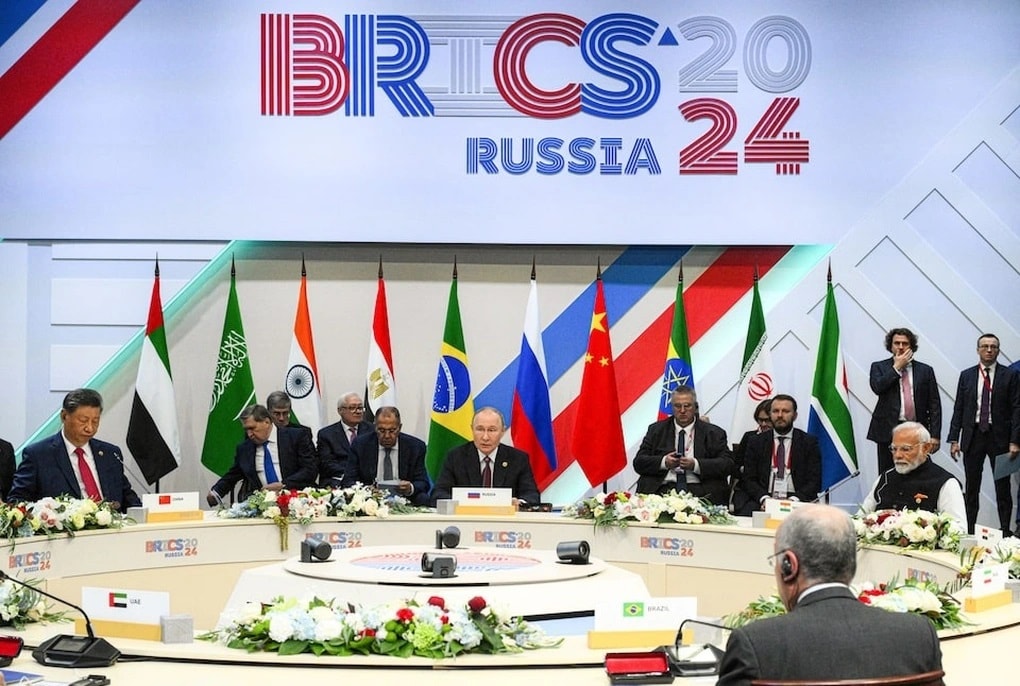Indonesia has become the first Southeast Asian country to join BRICS as an official member, marking an important milestone for the country's development and the structure of international relations.

BRICS is an economic and political cooperation organization established to promote development and cooperation among some of the world's leading emerging countries.
Quick decision
2024 is likely to be a successful year for Russia’s BRICS Presidency, as it will strongly arouse the world community’s interest in the group. This will be realized in the first days of 2025 with the participation of Indonesia, the first Southeast Asian country in the bloc.
Analysts say this is one of the fastest “upgrades” in the history of international organizations and other multilateral formats. At first glance, this decision may raise eyebrows among many observers and world leaders, raising speculation about BRICS’ consistency in admitting member countries as well as expanding its partners, and whether this will open up a chain effect for other countries on the shortlist to become official members of BRICS?
However, if we look deeper into the expansion of BRICS, Indonesia’s official membership is a carefully prepared roadmap. Indonesia’s candidate status was approved by the bloc’s first five member states in 2023 at the Johannesburg summit.
According to Brazil, Jakarta's official accession date in early 2025 is linked to the holding of the presidential election in Indonesia in 2024 and the country's desire to join after the new government cabinet is formed.
Besides, many opinions say that, if considering the list of 13 countries that will receive or have received partner country status after the BRICS Summit in Kazan/Russia, choosing Indonesia as the next official member of the bloc seems the most reasonable.
Indonesia is among the world's top 20 economies by nominal GDP, ahead of its other BRICS partners and some members of the group. Indonesia is the world's largest Muslim country, with a population larger than that of Brazil and South Africa combined.
Among developing countries, Indonesia is one of the most active participants in many major organizations, dialogue forums and multilateral formats, such as the Association of Southeast Asian Nations (ASEAN), the Group of 20 (G20), the Regional Comprehensive Economic Partnership (RCEP), the Asia-Pacific Economic Cooperation (APEC) and many others.
Finally, Indonesia is considered the “locomotive” of Southeast Asia, one of the fastest growing subregions in the world economically and strategically, which has long been a site of fierce competition between the US and China. This fact alone, in the opinion of many experts, makes Southeast Asia’s lack of representation in BRICS a strategic shortcoming.
Therefore, Indonesia’s accession to BRICS is not a “black swan” (an extremely rare and unpredictable event), but a “gray rhino” (an event that can happen but is often overlooked or delayed). Indonesia’s formal membership was not only expected, but to a certain extent, initiated in 2023, but for some reason, perhaps subjective or objective, it was only concretized during Russia’s rotating BRICS presidency.
Motivation
.jpg)
To explain Indonesia's decision to join BRICS, the following motivations can be mentioned.
Firstly, Indonesia's entry into BRICS once again reaffirms the commitment of the new leader Prabowo Subianto to strengthen the country's proactive and multilateral foreign policy. At the same time, President Prabowo Subianto's proactive and multilateral approach is directly linked to multilateral organizations, institutions and various formats. In fact, during President Prabowo Subianto's term, Indonesia also officially submitted its application to join the Comprehensive and Progressive Agreement for Trans-Pacific Partnership (CPTPP).
In this context, joining BRICS is the next and logical step from the perspective of the country's foreign policy positioning. It is no coincidence that, almost in parallel with the decision to join BRICS, Indonesia has been negotiating at the Defense Minister level with a US ally, Japan. It is characteristic that the statements of the Indonesian Foreign Ministry on the occasion of joining BRICS and the talks between the Indonesian and Japanese Defense Ministers on January 7, 2025, all mentioned friendship, prosperity and justice. This once again emphasizes the Indonesian leadership's multilateral foreign policy and its desire to expand economic, diplomatic and military relations with any country that can bring practical benefits to Jakarta.
Monday, it is undeniable that under the previous administration of Joko Widodo, Indonesia seemed to have little interest in BRICS. Until 2024, Indonesia still seemed to have a lack of understanding of BRICS, its purpose and objectives, and was concerned that its activities were contrary to Indonesia's traditions and foreign policy philosophy. The victory of incumbent President Prabowo Subianto has brought great momentum to Indonesia's desire to become an official member of BRICS.
Tuesday, Indonesia's accession to BRICS has profound political significance. This demonstrates the strengthening of cooperation among countries in the Southern Hemisphere. Now, BRICS is a gathering point, a prestigious multilateral platform to build close cooperative relationships, creating institutional and diplomatic conditions to ensure the role and position of non-Western countries.
With its full membership in BRICS, Indonesia is in an ideal position to enhance its international standing. On the one hand, BRICS has added more members from the Global South, which Indonesia is targeting. The UAE and Iran, countries with which Indonesia can cooperate to promote unity in the Muslim world. Together with Egypt and Ethiopia, Indonesia can promote new concepts of food security. Indonesia is currently the world's largest producer and exporter of palm oil.
On the other hand, many people believe that BRICS is still like a “blank sheet of paper”, not bound by any rules of the game or hierarchy. For Indonesia, this is an opportunity not only to be heard on the international stage, but also to promote more specifically the country’s core ideas.
Final, it is impossible to ignore President Prabowo Subianto’s personal ambition to make his mark in politics. In many ways, his foreign policy legacy will be judged on the extent to which he is able to articulate a unified agenda for the Global South and the development opportunities that Indonesia has as a member of BRICS.
HUNG ANH